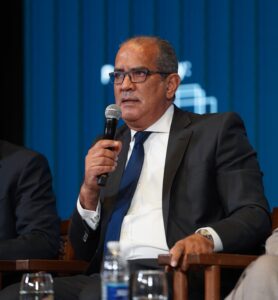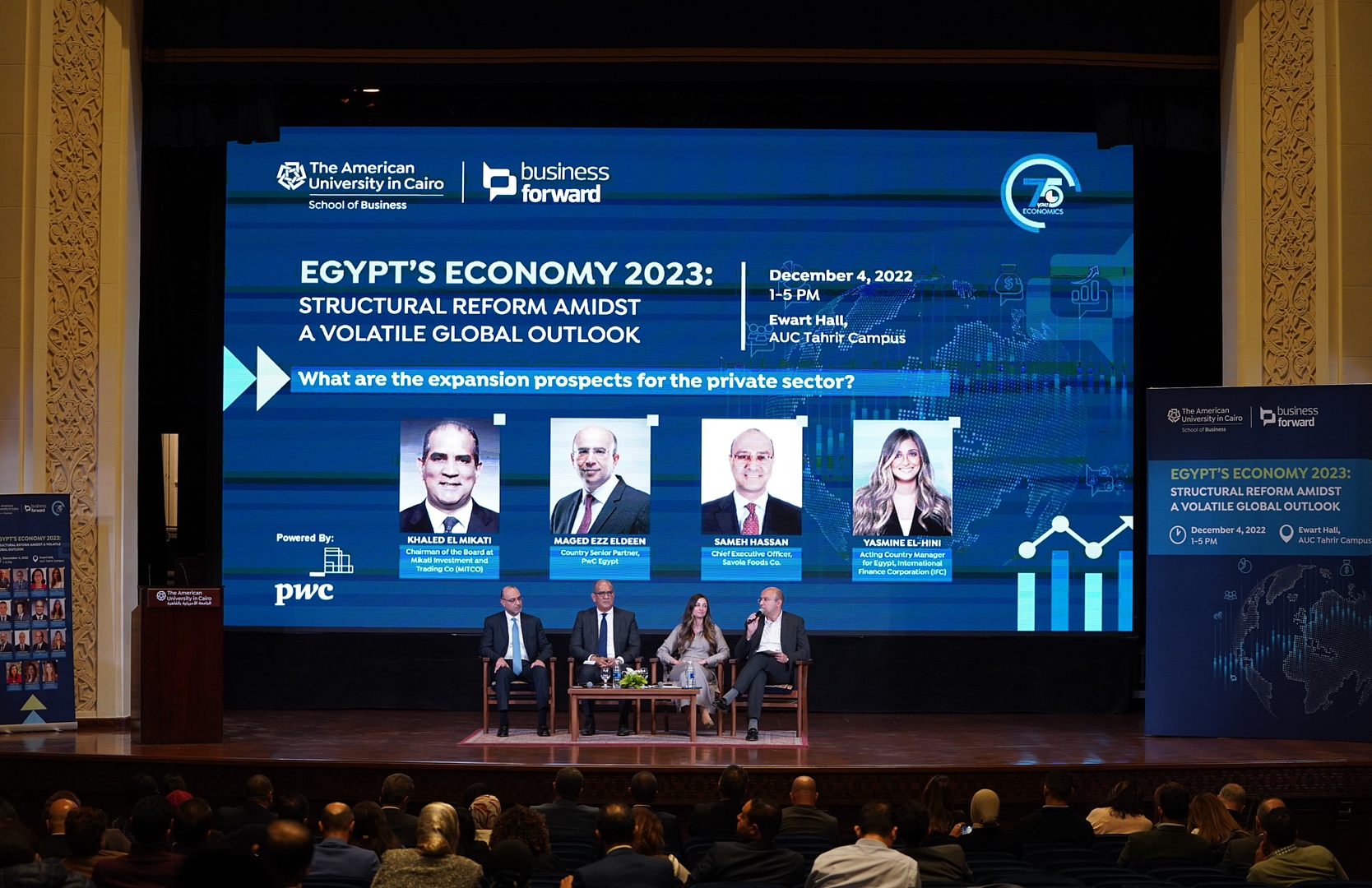As the Egyptian economy has been affected by local and international developments—the recent devaluation of the Egyptian pound being perhaps the most significant consequence—the private sector struggles to expand as desired.
“We saw a decline in the purchasing manager’s index (PMI), which is an indicator that the private sector is declining,” said Maged Ezzeldin, senior partner at PwC Egypt, as he moderated a session titled ‘What are the expansion prospects for the private sector?’ during the Business Forward Annual Event on December 4, 2022, where the way forward for the private sector in Egypt was discussed. Ezzeldin indicated that there is a common confusion with respect to the original cause behind a decelerated private sector, whether it is the government’s sole responsibility or not.
Less transparency and unpredictable policies
What private businesses face can differ depending on their size and activity; however, there are common barriers with which they struggle on a regular basis. For Khaled Mikati, chairman of the board at Mikati Investment and Trading Co (MITCO), the black market is counterproductive to all businesses, especially with the absence of a clear monetary policy. “The government has to eliminate the instability of monetary policies, since it increases the ‘unknowns’ for foreign investment,” he explained. Mikati asserted that amid unpredictable monetary, fiscal, procedural policies, FDI attraction becomes fiction.

“We saw a decline in the purchasing manager’s index (PMI), which is an indicator that the private sector is declining,” said Maged Ezzeldin, senior partner at PwC Egypt.
Could providing some incentives potentially attract investors? Mikati believes that “incentives are not long-term solution”. “Unless we have a proper transparent policy, we will not be able to increase our exports and surpass our challenges,” he added.
As investors find that restrictions weigh more than advantages, they look for more attractive markets. Sameh Hassan, chief executive officer at Savola Foods Co, established unpredictability of the economic environment to be the main factor behind FDI escape. “Every day [as a business] you have a new variable that you did not know about nor plan for and you are expected to comply,” he explained.
The same challenges have been highlighted in some analytical reports by international organizations. “Barriers to trade, rule of law, the role of the state and transparency are the three main issues that the IFC country private sector diagnostic report on Egypt identified,” said Yasmine El-Hini, acting country manager for Egypt at the International Finance Corporation (IFC).
PEMANDU or how to guide the private sector

“It is the unpredictability. Every day [as a business] you have a new variable that you did not know about nor plan for and you are expected to comply,” says Sameh Hassan ’87, chief executive officer at Savola Foods Co.
Hassan highlighted the lack of counseling from the Egyptian government’s side, namely the lack of coordination at the sub-ministerial level which results in overlapping restrictions that curtail any competitiveness for the private sector.
El-Hini referred to Malaysia’s success story of PEMANDU—which is Malaysian for “guide” as well as being an abbreviation of Performance Management and Delivery Unit—in order to shed light on how the private sector, civil service and the public sector can nurture a productive relationship to implement a national strategy.
The devaluation impact on investment and alternative avenues
It is undeniable that the currency’s devaluation has directly affected private sector activity. According to Hassan, investors figured out during this period that they had lost 500 percent of the profits of the previous year. He argued that devaluation is about resetting the whole fiscal system on annual basis, which raises risk among foreign investors.

Khaled Mikati, chairman of the board at Mikati Investment and Trading Co (MITCO) stressed on the endless investment opportunities in East and West Africa.
Luckily, local private investors can protect themselves from the high USD exchange rate by diversifying their activities in non-western countries. Mikati stressed on the endless investment opportunities in East and West Africa, but “you only need to know how to do business in Africa,” he implied, stressing on the importance of on-ground expertise and familiarity with the African business landscape.
Mikati identified many lucrative activities in the African continent such as assembling, notably in home appliances and technological equipment. One advantage to assembling is that it adds credit to the Egyptian brand while providing a product whose quality is equivalent to international brands. He also defined after-sales services to be as crucial as manufacturing since it allows investors to assure ample dissemination of their products. He provided a real market example of mutual cooperation between an Egyptian furniture producer whose products are assembled in Morocco, and from there, they would be exported to West Africa as a Moroccan brand.
For El-Hini, there are several ways to attract FDI, such as IPOs; however, it can be tricky since it is subject to global market conditions which affects the local stock market, thus hampering the government’s intentions to move ahead with those. Alternative investment schemes are strategic investments and Public-Private Partnerships (PPPs), which foster global-scale competitiveness, as well as concessional agreements.

“The number of investors you can bring in when you adopt environmental and social risk management just multiplies,” says Yasmine El-Hini, acting country manager for Egypt at the International Finance Corporation (IFC).
El-Hini indicated that global investors in their decisions are increasingly considering corporate governorate practices and solid financial management, as well as environmental and social risk management. “The number of investors you can bring in when you adopt environmental and social risk management just multiplies,” El-Hini argues, referring to the successful example of Egypt’s first green sovereign bond that was oversubscribed in 2020.
“You have a fork in the road, but there is a way out”
So, what can be done to reinvigorate the private sector in Egypt? Mikati alluded to the need for a clear and stable monetary policy with feasible tools to implement. He also mentioned the adoption of fiscal policy through which guided information would be shared with private stakeholders in total transparency, so that investors would better know where and how to invest.
For his part, Hassan summarized the ideal role of the government, becoming more of a regulator/facilitator and less of a commander/controller, and this will take the country to higher performance. Making the current investors happy first, is the starting point suggested by Hassan, simply because “investors talk to each other before going to make an investment in country X,” he said. Planning is another pillar which he deemed essential for a successful strategy to attract private investment by setting a clear strategy, structure, and staffing, and determine who is responsible for that process. Hassan concluded his point mentioning that Savola Foods Co. exports USD 200 million worth of products out of Egypt every year. While this brings great value to the Egyptian economy, the company seeks for more as their biggest competitor in Turkey sells billions to the exact same markets.
For El-Hini, while there is political will, the government cannot work on everything at the same time but should rather prioritize five pertinent sectors that could have direct outcome on the GDP and foreign currency generation, or have clear critical social outcomes, with clear KPIs. “You have a fork in the road, but there is a way out,” she affirmed, using Egypt’s renewable energy sector as a positive example of attracting investments.









